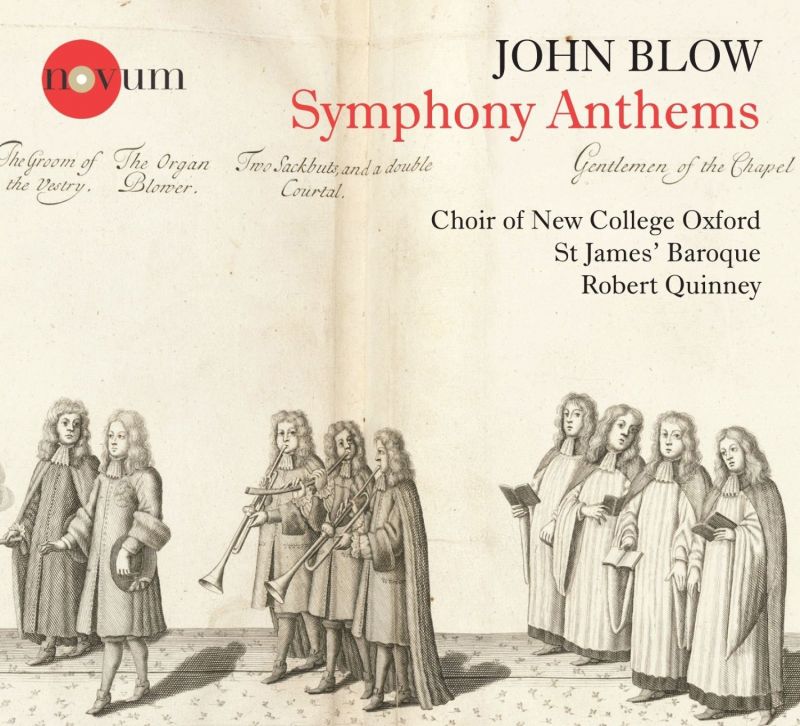BLOW Symphony Anthems
View record and artist detailsRecord and Artist Details
Composer or Director: John Blow
Genre:
Vocal
Label: Novum
Magazine Review Date: 09/2016
Media Format: CD or Download
Media Runtime: 73
Mastering:
DDD
Catalogue Number: NCR1389

Tracks:
| Composition | Artist Credit |
|---|---|
| God spake sometime in visions |
John Blow, Composer
John Blow, Composer New College Choir, Oxford Robert Quinney, Director St James’ Baroque |
| Hear my voice, O God |
John Blow, Composer
John Blow, Composer New College Choir, Oxford Robert Quinney, Director St James’ Baroque |
| O sing unto the Lord a new song: let the congregat |
John Blow, Composer
John Blow, Composer New College Choir, Oxford Robert Quinney, Director St James’ Baroque |
| When the Son of Man |
John Blow, Composer
John Blow, Composer New College Choir, Oxford Robert Quinney, Director St James’ Baroque |
| When Israel came out of Egypt |
John Blow, Composer
John Blow, Composer New College Choir, Oxford Robert Quinney, Director St James’ Baroque |
| I was glad when they said unto me |
John Blow, Composer
John Blow, Composer New College Choir, Oxford Robert Quinney, Director St James’ Baroque |
Author: David Vickers
The diligently researched programme covers the scope of Blow’s career, the earliest work being the plangent symphony anthem When Israel came out of Egypt, probably composed for Easter 1674; its concise string symphonies and expressive solo quartet verses are all performed exquisitely. Another less familiar gem is Hear my voice, O God, sung at the Chapel Royal in 1683 in the wake of a failed assassination plot against Charles II and the Duke of York; the psalm praying for deliverance from enemies presumably struck a poignant chord at court, and this performance achieves a beguiling juxtaposition of penitential strings, shapely choral passages and polished solo singing in the verses (notably from the countertenor Alexander Chance).
At the other end of the scale, God spake sometime in visions was sung at the coronation of James II and Mary of Modena in 1685; the eight-part choral singing is relaxed yet luminous and verse passages are judged beautifully by assorted choristers and clerks. The substantial O sing unto the Lord (1701) features more elaborate solo-voice verses, a sense of dramatic pacing, contrasting moods and textures, and a contrapuntal ‘Alleluia’ refrain that hints towards a proto-Handelian musical language. In Blow’s flamboyant setting of I was glad, composed for the official opening in 1697 of the chancel of Wren’s new St Paul’s Cathedral, two trumpets make radiant contributions to Guy Cutting’s stratospherically high tenor solo ‘The king shall rejoice’ and several choral sections.
All the works are given splendid performances which not only remind us that there is more to Blow than merely being Purcell’s mentor but also confirm that New College’s famous choir is in very good hands.
Discover the world's largest classical music catalogue with Presto Music.

Gramophone Digital Club
- Digital Edition
- Digital Archive
- Reviews Database
- Full website access
From £8.75 / month
Subscribe
Gramophone Full Club
- Print Edition
- Digital Edition
- Digital Archive
- Reviews Database
- Full website access
From £11.00 / month
Subscribe
If you are a library, university or other organisation that would be interested in an institutional subscription to Gramophone please click here for further information.




